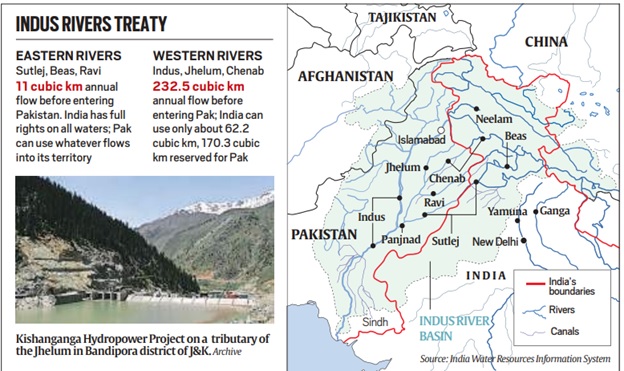
MORE THAN COURT ACTION, REVISIT THE INDUS WATER TREATY
The Indus Water Treaty of 1960 regulates the water courses between two riparian states of India and Pakistan.
MORE THAN COURT ACTION, REVISIT THE INDUS WATER TREATY
Indus Water Treaty of 1960 regulates the water courses between two riparian states of India and Pakistan.
The treaty vests proprietary rights in the eastern rivers (Sutlej, Ravi, and Beas) to India and of the western rivers (Indus, Jhelum, Chenab) to Pakistan. It, however, permits India to use waters of the western rivers for domestic use, non-consumptive use, agriculture, and hydropower (run-of-the-river protects).
In January this year, Pakistan initiated arbitration at the Hague-based Permanent Court of Arbitration to address the interpretation and application of the IWT to certain design elements of two hydroelectric projects— on the Kishanganga and Ratle, on the Chenab. India objected that the Court is not competent to consider such questions. However, in July the court unanimously passed a decision rejecting India's objections.
It is important to note that the IWT does not take into account future water availability. It requires Pakistan to let flow and shall not permit an interference with the waters of the eastern rivers. India, similarly, is obligated to let flow all the water of the western rivers and shall not permit any interference with these waters except for certain uses which include generation of hydroelectric power on the rivers and tributaries of the western rivers before they flow into Pakistan.
However, the two countries seem to have a divergent view on the purpose of the Treaty. This can be done away with by the help of two cardinal principles— equitable and reasonable utilization (ERU) and the no harm rule (NHR).
In a situation of conflict between different uses of water, it is suggested in Article 10 of the 1997 Convention on the Law of the Non-navigational Uses of International Watercourses to lean on "vital human needs" in the context of the ERU and the NHR.
In an atmosphere of lack of trust between both the parties, the World Bank, a third party to IWT, may use its forum to build convergent state policies, thus revising the treaty.
